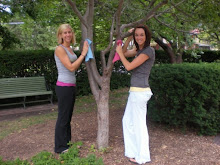
It seems these days that every time I go to the grocery store, I see more and more items with the claim of "organic" on the label. These items are almost always more expensive (sometimes MUCH more expensive) but I often feel compelled to shell out the extra dough to make myself healthier.
The fact of the matter is, there are some foods that are much safer for both you and the environment, if they are purchased organically. Then there are some with fewer health risks that can still be purchased in the traditional manor.
If you find yourself in the grocery store isle, debating over the organic version of your favorite food and its cheaper, non-organic counterpart, there are a few questions you could ask yourself to help make the decision.
-If a fruit or vegetable, how thick is its skin or covering? Would it be easy to puncture?
-What part of the world did this food travel from and what might be their standards for using chemicals/pesticides?
-Is this fruit or vegetable in season in this part of the world?
The following is a list compiled from several websites, including www.thedailygreen.com and it contains the foods that would be best purchased in their organic forms.
- Meat Animals that are raised for meat production are typically fed grains treated with pesticides, also are given antibiotics, and growth hormones. Some cows also are fed parts of other cows, which is a common cause of Mad Cow disease. If a meat product is certified organic, the USDA states that it will be free of pesticides, hormones, and antibiotics.
- Milk Organic dairies feed cows only grains that are free from pesticides, and these cows are not given antibiotics or growth hormones such as rGBH or rbST.
- Coffee Look for Fair Trade Certified Organic labels to ensure that no pesticides were used on plants and that fair wages were paid to farm workers producing the coffee.
- Fruits such as peaches, apples, strawberries, grapes, cherries, raspberries, and pears These fruits all have delicate skins and are most highly treated with pesticides.
- Juices that contain above fruits
- Vegetables such as bell peppers, lettuce, spinach, potatoes, and tomatoes Again, big recipients of pesticides/fungicides.
On the other hand, the following foods are considered to be safe when consumed in their non-organic form, as they don't heavily retain pesticides: asparagus, avocados, bananas, broccoli, cauliflower, corn, kiwi, mangoes, onions, papayas, pineapples, and sweet peas.

